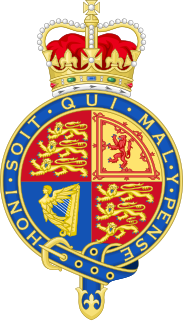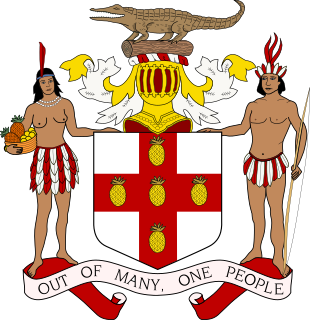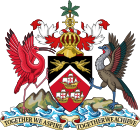
The Government of Barbados (GoB), is ceremonially headed by the monarch, Queen Elizabeth II as head of state. She is represented in the country by the Governor-General, currently Dame Sandra Mason, G.C.M.G., K.A.

The Judicial Committee of the Privy Council (JCPC) is the highest court of appeal for certain British territories, some Commonwealth countries and a few UK bodies. Established on 13 August 1833 to hear appeals formerly heard by the King-in-Council, the Privy Council formerly acted as the court of last resort for the entire British Empire, and continues to act as the highest court of appeal for several independent Commonwealth nations, the Crown Dependencies, and the British Overseas Territories.

The politics of Trinidad and Tobago function within the framework of a unitary state regulated by a parliamentary democracy modelled on that of the United Kingdom of Great Britain and Northern Ireland, from which the country gained its independence in 1962. Under the 1976 republican Constitution, the monarch was replaced as head of state by a President chosen by an electoral college composed of the members of the bicameral Parliament, consisting of the Senate and the House of Representatives.

The Supreme Court of New Zealand is the highest court and the court of last resort of New Zealand. It formally came into being on 1 January 2004 and sat for the first time on 1 July 2004. It replaced the right of appeal to the Judicial Committee of the Privy Council, based in London. It was created with the passing of the Supreme Court Act 2003, on 15 October 2003. At the time, the creation of the Supreme Court and the abolition of appeals to the Privy Council were controversial constitutional changes in New Zealand. The Act was repealed on 1 March 2017 and superseded by the Senior Courts Act 2016.
The Caribbean Court of Justice is the judicial institution of the Caribbean Community (CARICOM). Established in 2005, it is based in Port of Spain, Trinidad and Tobago.

Singapore practices the common law legal system, where the decisions of higher courts constitute binding precedent upon courts of equal or lower status within their jurisdiction, as opposed to the civil law legal system in the continental Europe. The current criminal code was preceded by the Indian Penal Code which was adopted when Singapore was a crown colony. The judiciary in Singapore is divided by the Constitution of Singapore into the Supreme Court, as well as subordinate courts, namely the State Courts and Family Justice Courts. It is led by the Chief Justice, currently Sundaresh Menon.

The Supreme Court of the Republic of Singapore is one of the two tiers of the court system in Singapore, the other tier being the State Courts.

The Court of Appeal of the Republic of Singapore is the nation's highest court and its court of final appeal. It is the upper division of the Supreme Court of Singapore, the lower being the High Court. The Court of Appeal consists of the Chief Justice of Singapore, who is the President of the Court, and the Judges of Appeal. The Chief Justice may ask judges of the High Court to sit as members of the Court of Appeal to hear particular cases. The seat of the Court of Appeal is the Supreme Court Building.

A supreme court is the highest court within the hierarchy of courts in many legal jurisdictions. Other descriptions for such courts include court of last resort, apex court, and highcourt of appeal. Broadly speaking, the decisions of a supreme court are not subject to further review by any other court. Supreme courts typically function primarily as appellate courts, hearing appeals from decisions of lower trial courts, or from intermediate-level appellate courts.

The Judiciary of Ghana comprises the Superior Courts of Judicature, established under the 1992 Constitution, and the Inferior Courts, established by Parliament. The hierarchy of courts derives largely from British juridical forms. The courts have jurisdiction over all civil and criminal matters.

The Federal Court of Malaysia is the highest court and the final appellate court in Malaysia. It is housed in the Palace of Justice in Putrajaya. The court was established during Malaya's independence in 1957 and received its current name in 1994.

Lesbian, gay, bisexual, and transgender (LGBT) persons in Belize face legal challenges not experienced by non-LGBT citizens. Same-sex sexual activity was decriminalized in Belize in 2016, when the Supreme Court declared Belize's anti-sodomy law unconstitutional. Belize's constitution prohibits discrimination on the basis of sex, which Belizean courts have interpreted to include sexual orientation.

The judiciary of Jamaica is based on the judiciary of the United Kingdom. The courts are organized at four levels, with additional provision for appeal to the Judicial Committee of the Privy Council in London. The Court of Appeal is the highest appellate court. The Supreme Court has unlimited jurisdiction in all cases, and sits as the Circuit Court to try criminal cases. The Parish Court in each parish hears both criminal and civil cases, excluding grave offences. The Petty Sessions are held under Justices of the Peace, with power to hear minor crimes.

The Supreme Court of Judicature of Barbados is the highest judicial body in the country of Barbados. It is made up of the High Court and the Court of Appeals.

The Judiciary of Barbados is an independent branch of the Barbadian government, subject only to the Barbadian Constitution. It is headed by the Chief Justice of Barbados. Barbados is a common law jurisdiction, in which precedents from English law and British Commonwealth tradition may be taken into account.

The Judges' Council is a body in England and Wales that, representing the judiciary, advises the Lord Chief Justice on judicial matters. It has its historical roots in the original Council of the Judges of the Supreme Court, created by the Judicature Act 1873 to oversee the new Supreme Court of Judicature. This body initially met regularly, reforming the procedure used by the circuit courts, and the new High Court of Justice but met less regularly as time went on, meeting only twice between 1900 and 1907, with a gap of ten years between meetings in 1940 and 1950 respectively. After relative inactivity, it was eventually wound up through the Supreme Court Act 1981, which contained no provisions for its continued existence, something Denis Dobson attributes to newer bodies which performed the duties the Council had originally been created to do.
The Supreme Court of Judicature of Belize is one of three types of courts in Belize, the lower ones being the Magistrate's Courts and the Court of Appeal. It is a court of original jurisdiction in both civil and criminal cases as well as an appellate court. It is governed by the Supreme Court of Judicature Act (SCJA).
The Judiciary of Sri Lanka are the civil and criminal courts responsible for the administration of justice in Sri Lanka. The Constitution of Sri Lanka defines courts as independent institutions within the traditional framework of checks and balances. They apply Sri Lankan Law which is an amalgam of English common law, Roman-Dutch civil law and Customary Law; and are established under the Judicature Act No 02 of 1978 of the Parliament of Sri Lanka.

The judiciary of New Zealand is a system of courts that interprets and applies the laws of New Zealand. It has four primary functions: to provide a mechanism for dispute resolution; to deliver authoritative rulings on the meaning and application of legislation; to develop case law; and to uphold the rule of law, personal liberty and human rights.
Her Honour Judge Althea Violet Alexis-Windsor, is a Judge of the International Criminal Court. She has been a high court judge of Trinidad and Tobago.













